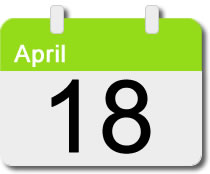NTPP Update: A Bold Experiment in Four Communities
Wednesday, April 18th • 2:00 to 3:30 pm CST
In-street Bicycle Parking: What, When, Where and How Much?
Wednesday, May 16th • 2:00 to 3:00 pm CST
RSVPs are appreciated but not necessary. Hope to see you then!
cheers,
Beth
* * * * *
Association of Pedestrian and Bicycle Professionals (APBP) presents:
NTPP Update: A Bold Experiment in Four Communities
Wednesday, April 18th • 2:00 to 3:30 pm CST
This webinar will focus on success stories and lessons learned from
the four Nonmotorized Transportation Pilot Program (NTPP) communities in
the U.S.  The
NTPP program was established in 2005 "to construct…a network of
nonmotorized transportation infrastructure facilities, including
sidewalks, bicycle lanes, and pedestrian and bicycle trails, that
connect directly with transit stations, schools, residences, businesses,
recreation areas, and other community activity centers.” U.S. federal
transportation legislation (SAFETEA-LU) provided $25 million for each of
the four NTPP communities – areas with unique physical and demographic
characteristics, and at various stages of implementing their respective
nonmotorized networks -- and was designed to develop statistical
information on transportation mode share shift before and after program
implementation.
The
NTPP program was established in 2005 "to construct…a network of
nonmotorized transportation infrastructure facilities, including
sidewalks, bicycle lanes, and pedestrian and bicycle trails, that
connect directly with transit stations, schools, residences, businesses,
recreation areas, and other community activity centers.” U.S. federal
transportation legislation (SAFETEA-LU) provided $25 million for each of
the four NTPP communities – areas with unique physical and demographic
characteristics, and at various stages of implementing their respective
nonmotorized networks -- and was designed to develop statistical
information on transportation mode share shift before and after program
implementation.
Learn which specific programs and projects succeeded, what may be replicable and transferable to other communities, and how much money should be budgeted for success. The pilot communities will provide insight on various aspects of planning and project implementation, including innovation, leveraging resources, capacity building and the importance of community input and partnerships. A representative from the U.S. Department of Transportation's Volpe Center will also discuss the importance of evaluation, and the development and implementation of a common methodology for data collection and analysis. Presenters are Ted Curtis, Columbia, Missouri; Dan Dawson, Marin County, California; Tony Hull, Minneapolis, Minnesota; and Emily Vetting, Sheboygan County, Wisconsin. APBP has applied to the AICP for 1.5 Certification Maintenance credits for this webinar, and will provide an attendance certificate to those who document their professional development hours.
MARK YOUR CALENDARS!
In-street Bicycle Parking: What, When, Where and How Much?
Wednesday, May 16th • 2:00 to 3:00 pm CST
Increasingly communities face the dilemma of bicycles and pedestrians
competing for scarce sidewalk space. As pedestrian activity increases
wider sidewalks are needed, while as cycling increases more bicycle
parking—traditionally placed on sidewalks—is also needed. In-street
bicycle corrals allow agencies to place bicycle parking in the street,  off
the pedestrian way, resolving this conflict and making more efficient
use of existing parking spaces. However, jurisdictions may hesitate to
undertake bicycle corrals since there are few design examples and little
specific guidance on which to base such projects. Planners, engineers,
developers and advocates should attend this webinar to learn how to
scale up bicycle parking to meet growing demand while avoiding negative
impacts to the pedestrian environment.
off
the pedestrian way, resolving this conflict and making more efficient
use of existing parking spaces. However, jurisdictions may hesitate to
undertake bicycle corrals since there are few design examples and little
specific guidance on which to base such projects. Planners, engineers,
developers and advocates should attend this webinar to learn how to
scale up bicycle parking to meet growing demand while avoiding negative
impacts to the pedestrian environment.
Placing bicycle parking in the street presents unique challenges for traffic engineers and streetscape designers. Issues include roadway operations, cyclist and pedestrian safety, placement of a bike corral in relation to other sidewalk and street design elements, pedestrian flows and adjacent land uses. The webinar will address these challenges with examples of successful in-street bicycle parking projects (examples from New York City, Portland, and Washington D.C.). Presenters will also define best practices for providing bicycle parking in the street and discuss how a program might progress, beginning with public process and moving through costs, installation, and maintenance.
Presenters include Eric Anderson, City of Berkeley, California; Sarah Figliozzi, Portland Bureau of Transportation; Chris Holben, District Department of Transportation; and Hayes Lord, New York City Department of Transportation. APBP has applied to the AICP for one Certification Maintenance credit for this webinar, and will provide an attendance certificate to those who document their professional development hours.
--
Beth McKechnie | Workplace Commuter Options
3rd floor, 303 Portage Ave | (204) 925-3772 | Find us here